/hafˈkäkt/
All was going pretty well on Rhodes until 1912. That was the year Italy seized Rhodes from the Turks. It was at this point, under Italian passports, that my great-grandparents had the good judgment to get out. For those that stayed behind, anti-Jewish laws began to spread on Rhodes. Notwithstanding the increasingly harsh environment, by 1941 there were about 1,800 Jewish people living in Rhodes. There were four Synagogues.
In 1943 the Germans occupied Rhodes. At first, nothing changed. The people fell into a peaceful hope that all would be fine. Then in July 1944, with the war almost over, the occupying German forces ordered all 1600 Sephardic Jews of Rhodes to present themselves carrying any gold or jewelry they possessed. According to one account from a survivor, "like idiots, we all turned up."
The Germans detained the Jews of Rhodes for three days. Then they set off the air raid sirens so everyone else would hide away
Welcome back, Your Dreams Were Your Ticket Out. Pt. III
Rhodes, Greece
All was going pretty well on Rhodes until 1912. That was the year Italy seized Rhodes from the Turks. It was at this point, under Italian passports, that my great-grandparents had the good judgment to get out. For those that stayed behind, anti-Jewish laws began to spread on Rhodes. Notwithstanding the increasingly harsh environment, by 1941 there were about 1,800 Jewish people living in Rhodes. There were four Synagogues.
In 1943 the Germans occupied Rhodes. At first, nothing changed. The people fell into a peaceful hope that all would be fine. Then in July 1944, with the war almost over, the occupying German forces ordered all 1600 Sephardic Jews of Rhodes to present themselves carrying any gold or jewelry they possessed. According to one account from a survivor, "like idiots, we all turned up."
The Germans detained the Jews of Rhodes for three days. Then they set off the air raid sirens so everyone else would hide away
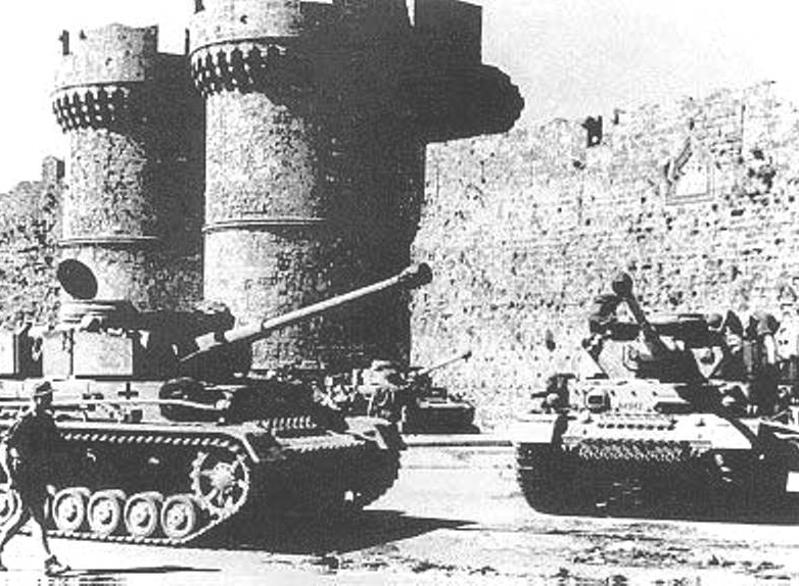
and could not see as their Jewish neighbors boarded boats, 500 per ship, for an eight-day journey to Piraeus, Greece. I buy a book that recounts this painful history. The author, one of the few survivors writes:
We made our way to the harbor on foot. We left behind our fair island of "Roses," our beautiful sea, our homes, our dead, our friends and all our belongings. Crammed more than five hundred per boat, squeezed against one another, unable to breathe, scared, we set sail. Our grief was infinite.
--Lucia Capelluto, My Life in Auschwitz and Bergen Belson, Testimony.
The history of Jewish Rhodes ended on that sad summer day in 1944. All but 151 of the Jews on those boats were murdered. Many,
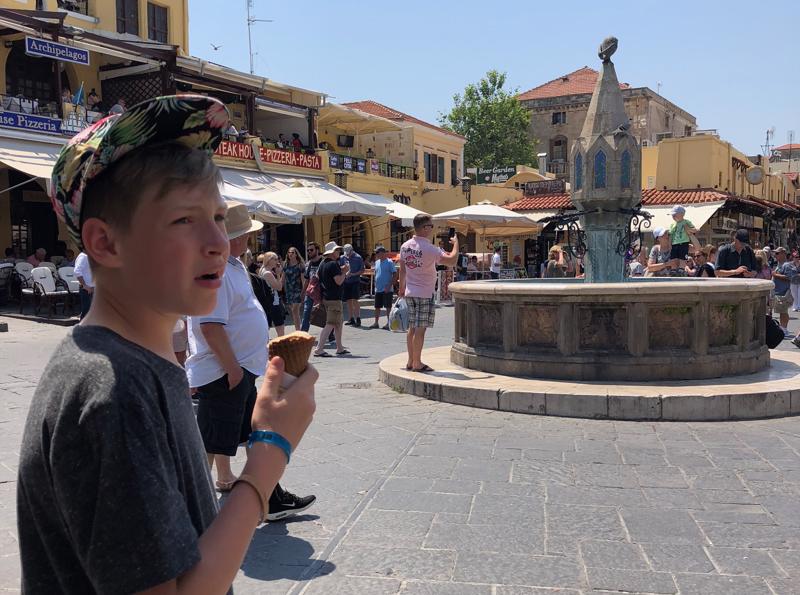
many Hassons, Touriels, and Alhadeffs were among those lost.
Needless to say, there aren't many Jews left on the island. 35 actually. The Holocaust hangs heavy in the air here in the Jewish Quarter of the Old City. One synagogue remains. Constructed in 1577, Kahal Shalom Synagogue is the oldest synagogue in Greece. The synagogue holds services only in the summer when folks like us come back to Rhodes seeking our Jewish roots.
We stop in to meet with the Synagogue director. She has thick old books. These contain records of every family member who ever belonged to this shul, she says. She patiently thumbs through her books looking for the names we give her. Some of our family names date back to the 1800s. No luck. None of our Touriels, Hassons, or Alhadeffs are listed. This reminds me of an old Jewish joke.
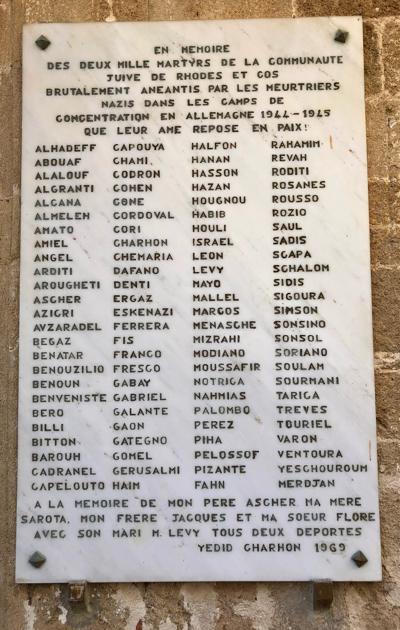
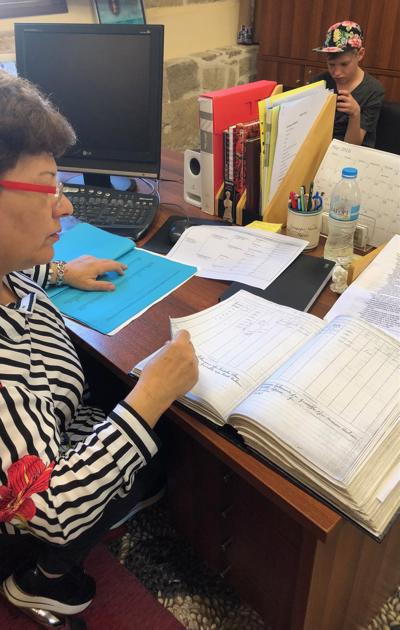
Two Jews are stranded on a desert island. They immediately build three synagogues - one for the first guy, one for the second, and one that neither of them would be caught dead in.
Clearly, my people were not going to step foot in this synagogue. The reason...I'll never know. The only place I do see Touriels, Hassons, and Alhadeffs at the synagogue is on the plaque remembering those killed in the Holocaust. This is how it is here in the Old Country. Happy one moment. Sad the next. Our life in Spain is the same way.
Rhodes is spectacular. It is an ancient medieval city but also a functioning living breathing town. Within the walls of the city, and
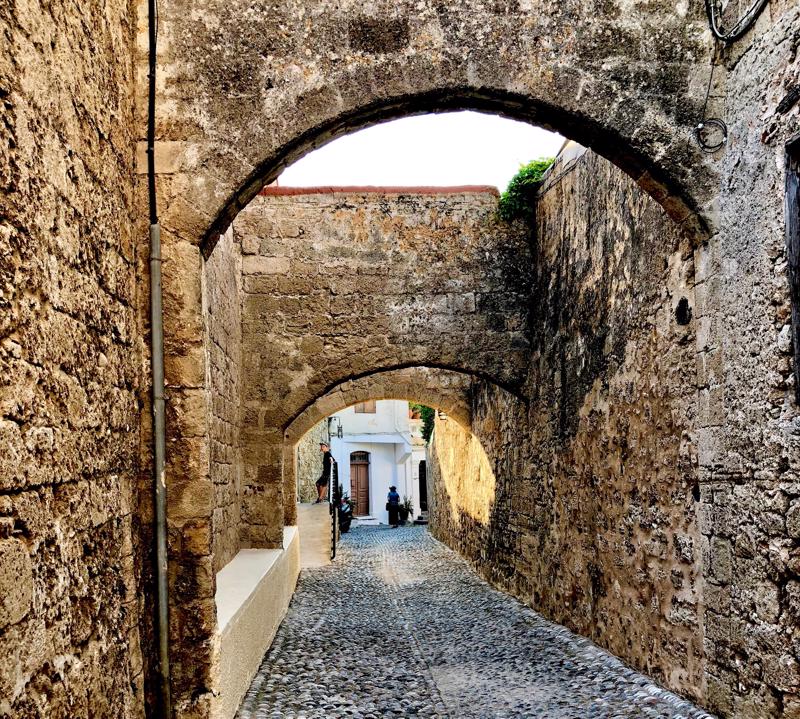
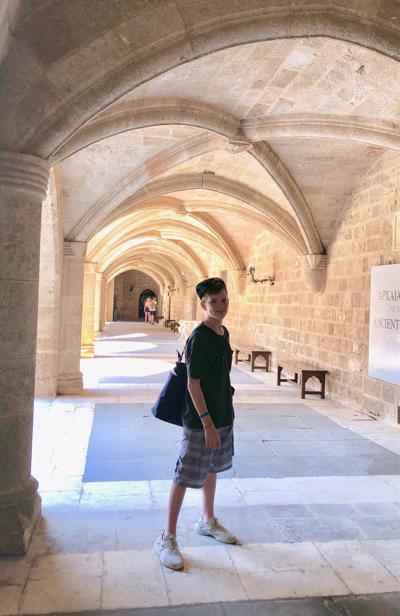
under the eaves of the castles and palaces are restaurants, hip bars, toy stores, jewelry stores, and the like.
The Boy wants to explore the castle, so we head there. It is a beautifully preserved castle, turrets and all, originally built in the late 7th century as a Byzantine citadel. There are tunnels to explore. Walls to climb. I am again struck by how very young the United States is. This castle stood here for more than a thousand years before anyone had heard of Alexander Hamilton. It is funny what passes for old history in America.
We head back to the Jewish Quarter. We revisit Calle de los Ricos, Walk down Via de Canaan ("Way of Canaan") and even an Alhadeff Street. It is a strange thing to walk on a street full of ghosts. Because the streets are bombed out, there isn't much foot traffic. We are essentially alone with the ancestors.
What I will say is that I don't feel a ton of love for Jewish history here the way I do in Spain. Although we are obviously looking at one home owned by what must have been an ancient relative of mine -- Daniel Turiel -- the residents sitting out front take no interest in us.
The Boy and I check out the toy store. I stumble upon wooden shadow puppets called Karagiozis. The shopkeeper explains these wood stick
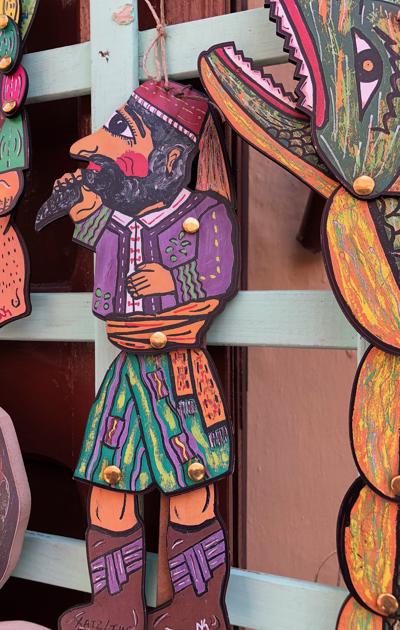
puppets are traditional entertainment depicting the story of a poor hunchbacked Greek, who uses trickery to get what he needs. Puppeteers used stock characters to invent new stories to entertain "before TVs and XBoxes," he explains.
I am instantly drawn to a distinctly anti-semitic-looking puppet. Big nose, long hair in front, and clothing finery. I buy it at once.
The Boy is mortified as I explain to the shopkeeper that "I have a strong interest in anti-semitic imagery." "You sound like a neo-Nazi," he despairs. The shopkeeper insists the puppet is not Jewish but merely a "tax collector" for the king. Uh huh. I've heard that before.
It turns out, I've purchased "Solomon," known simply as "the Jew" in Greek. According to my research, Solomon is a "rich businessman from Thessaloniki." Thessaloniki is in eastern Greece. A stones throw from Istanbul. Both cities were hubs for Sephardic Jews fleeing Spain after 1492. Both were Sanctuary Cities for refugees.
And from what I know of the history of pograms and expulsion on Rhodes in the 1500s, chances are pretty good that my family didn't come straight to Rhodes from Spain. More likely, we came here via Thessaloniki too. Otherwise, we'd be dead.
So, I've bought a Spanish Jew
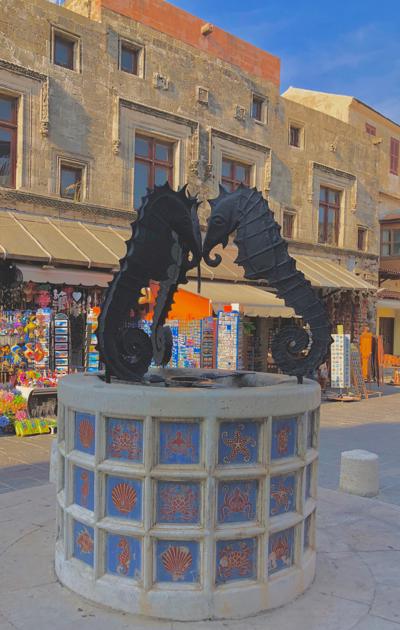
as seen by the Greeks in the 1500s. Both "Solomon" I are wealthy Jews from Thessaloniki. The world is circling in on itself now.
The next day, we take a break from the old city to go to the Acropolis of Lindos. These are stunning ancient remains that include a Temple to Athena Lindia and a 20-columned Hellenistic stoa. Silhouetted against the deep blue sky, the white columns are dazzling, while the long-range coastal views are out of this world. And we get to ride up to the top on donkeys. (Sorry PETA).
On our last day in town, we go back to the Jewish business section in the old city. There is a bike shop there that my Aunt says was once the family-run bakery. The Boy finds the shop, which now sells frozen yogurt, not bikes. After we explain why we are there, the shopkeeper is happy to have us take a look around. And sure enough, there in the stone walls are the outlines of the fiery brick ovens. This is where
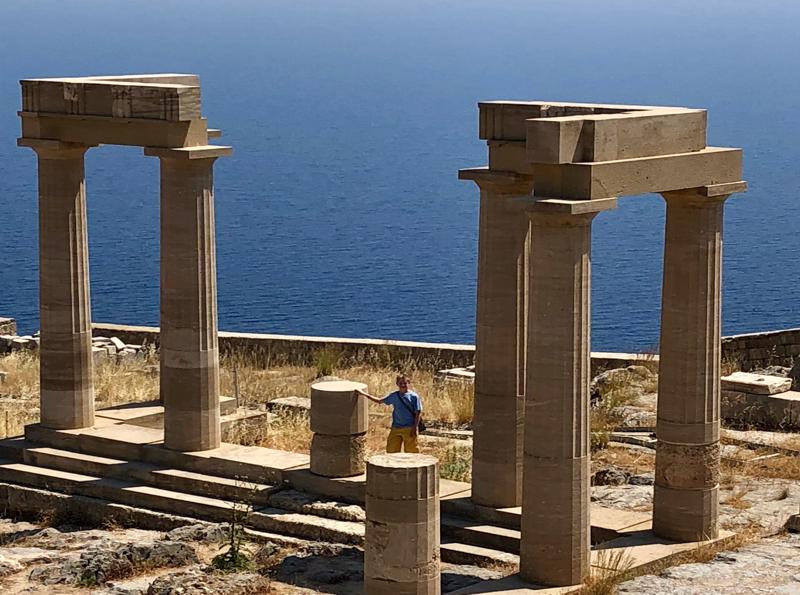
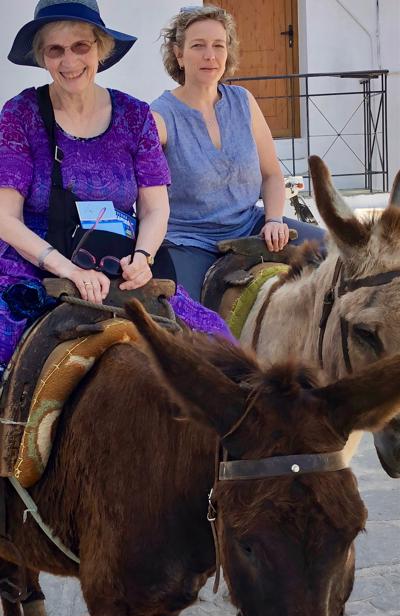
my family made a living after they were expelled from Spain and before they were taken away by the Nazis.
The Boy is quiet. I am quiet. Mi Madre is quiet. I can feel the generations working so hard to survive. After living through mobs coming to attack us, leaving the shores of Spain, finding our way to Rhodes, then narrowly escaping the Holocaust, I say it out loud. "We are damn lucky to be alive." The odds were certainly against us.
And back in Spain, life is beautiful again. May their memory be a blessing.
We must accept finite disappointment, but never lose infinite hope.
- Martin Luther King
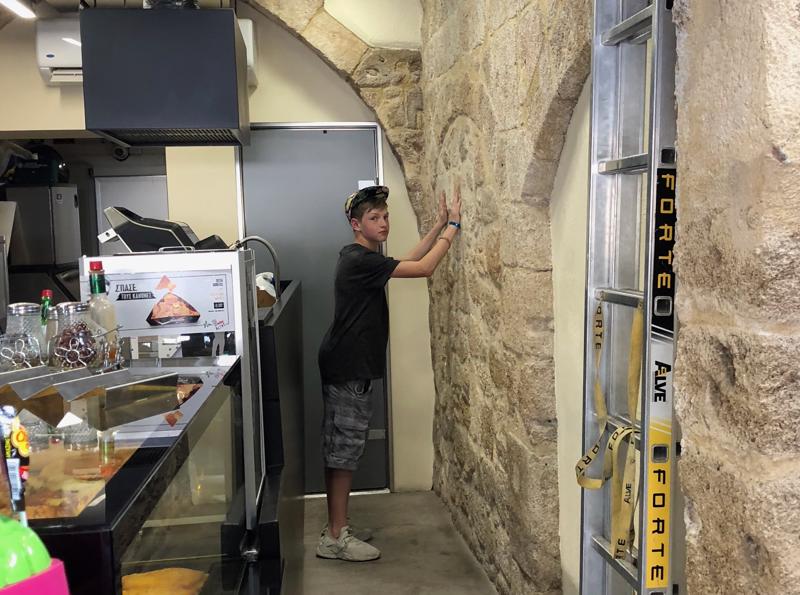
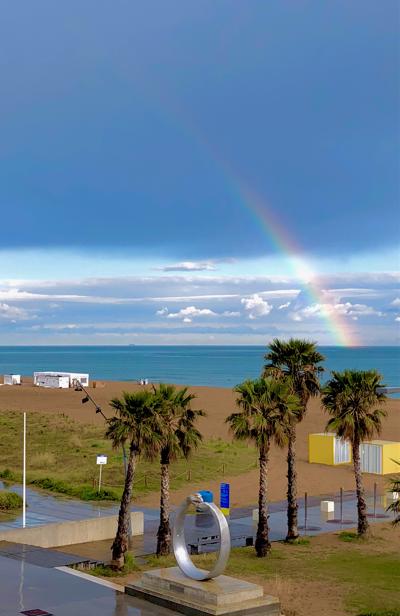
1.
The Get Down
2.
Norte Americanos Depart
3.
La Playa Castelldefels
4.
Failing Grocery Store 101
5.
On to Barcelona
6.
Settling in to Barcelona
7.
Train Hard Stay Humble
8.
Pass the Patatas Bravas
9.
Somebody Bring Me Some Water
10.
Quest for the Gel of Glory
11.
Jesus Is Just Alright
12.
Four Fingers of Blood
13.
The right tool for the job
14.
The Heart of the Matter
15.
Now You Know
16.
Welcome back, Your Dreams Were Your Ticket Out. Pt. I
17.
Welcome back, Your Dreams Were Your Ticket Out. Pt. II
18.
Welcome back, Your Dreams Were Your Ticket Out. Pt. III
Share your travel adventures like this!
Create your own travel blog in one step
Share with friends and family to follow your journey
Easy set up, no technical knowledge needed and unlimited storage!
© 2025 Travel Diaries. All rights reserved.